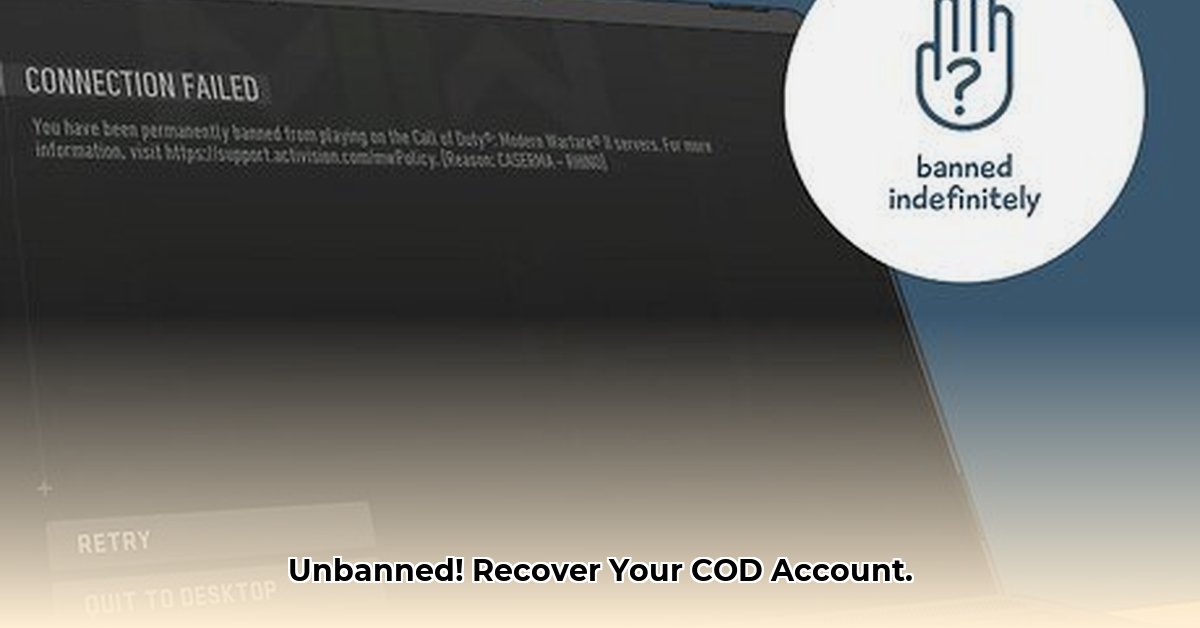Losing access to your Call of Duty account due to a ban can be incredibly frustrating. This guide provides a comprehensive overview of the ban appeal process, explains common reasons for bans, and offers proactive steps to secure your account and avoid future issues. While a successful appeal isn’t guaranteed, understanding the process and presenting a well-structured case significantly increases your chances.
Understanding Call of Duty Bans
Before initiating an appeal, it’s crucial to understand the type of ban imposed on your account. This will determine your next steps and the likelihood of a successful appeal.
- Temporary Bans: These are short-term suspensions, typically lasting a few days or weeks. They often result from minor infractions, such as inappropriate in-game chat, triggering anti-cheat systems due to unusual gameplay patterns, or temporary server issues. Temporary bans are generally not appealable.
- Permanent Bans: This is a complete lockout from Call of Duty, usually resulting from serious offenses like confirmed cheating (using unauthorized third-party software, exploiting glitches, or other unfair practices), repeated violations of the Code of Conduct, or account security breaches. Appealing a permanent ban is challenging but possible if you can provide strong evidence to support your case.
- Shadowbans: A shadowban is a stealthy restriction that limits your matchmaking options. While you can still play the game, you’ll experience significantly longer matchmaking times, be placed in lobbies with suspected cheaters, and face opponents with vastly different skill levels. Shadowbans are difficult to appeal as they are often triggered by automated systems detecting suspicious patterns rather than explicit violations.
Determining the specific reason for your ban is essential. Carefully review the official notification from Activision, which should provide insights into the nature of the infraction. This information will help you tailor your appeal effectively.
Appealing a Permanent Ban
If you believe you’ve received a permanent ban unjustly, such as due to a hacked account or a false positive from the anti-cheat system, you can submit an appeal.
Gathering Evidence
Building a strong case requires compelling evidence that demonstrates your innocence or mitigating circumstances. Consider the following:
- Screenshots: Capture any suspicious activity, such as unfamiliar login locations, unauthorized purchases, or communication indicating a compromised account. Ensure screenshots include timestamps for verification.
- Account Activity Logs: Access and review your Activision account history for any unusual logins, gameplay patterns, or transactions. Document these instances thoroughly.
- Communication Records: If you interacted with Activision support regarding the ban, retain copies of email exchanges or support tickets.
- Supporting Documentation: Any other evidence that strengthens your claim, such as police reports if you’ve reported a hacking incident, can significantly improve your appeal.
Submitting the Appeal
Activision provides an online form for ban appeals. Complete this form thoroughly, accurately, and with clear, concise language.
- Be Respectful: Maintain a professional and respectful tone throughout your appeal. Avoid accusatory or aggressive language.
- Be Honest: Provide accurate information and avoid fabricating evidence. Honesty is paramount in the appeals process.
- Be Concise: Clearly state your case, avoid unnecessary jargon or emotional pleas, and focus on presenting the facts and evidence supporting your claim.
The Waiting Game
Activision’s response times to appeals can vary. Exercise patience and avoid submitting multiple appeals, as this could further delay the process.
Crafting a Winning Appeal
A successful appeal requires a compelling narrative supported by strong evidence. Ensure you address the following:
- Account Information: Accurately provide your Activision ID, linked email address, and any other relevant account details.
- Detailed Explanation: Thoroughly explain the situation, including the date and time of the ban, the specific reason cited by Activision, and your perspective on the events.
- Concrete Evidence: Attach all gathered evidence, clearly labeled and organized.
- Professional Tone: Maintain a respectful and professional tone throughout your communication.
Next Steps if Your Appeal is Denied
A denied appeal isn’t necessarily the end. If you obtain new evidence, consider resubmitting your appeal. However, repeated appeals without new information are unlikely to change the outcome.
Preventing Future Bans
Proactive security measures are the best defense against account bans.
- Strong Passwords: Employ a strong, unique password for your Activision account and change it regularly. Consider using a password manager.
- Two-Factor Authentication (2FA): Enable 2FA for enhanced security. This adds an extra layer of protection against unauthorized access.
- Avoid Third-Party Tools: Refrain from using unauthorized third-party software or hacks that violate Activision’s terms of service.
- Adhere to the Code of Conduct: Familiarize yourself with and adhere to Call of Duty’s Code of Conduct, which outlines acceptable in-game behavior and practices.
Activision Support – Ban Appeals
- How to Fix Installation Stopped Xbox One Digital Download - February 15, 2026
- Resolve Game Not Installing on Xbox One Installation Problems - February 14, 2026
- Troubleshoot When Disc Installation Stopped on Xbox One - February 13, 2026
